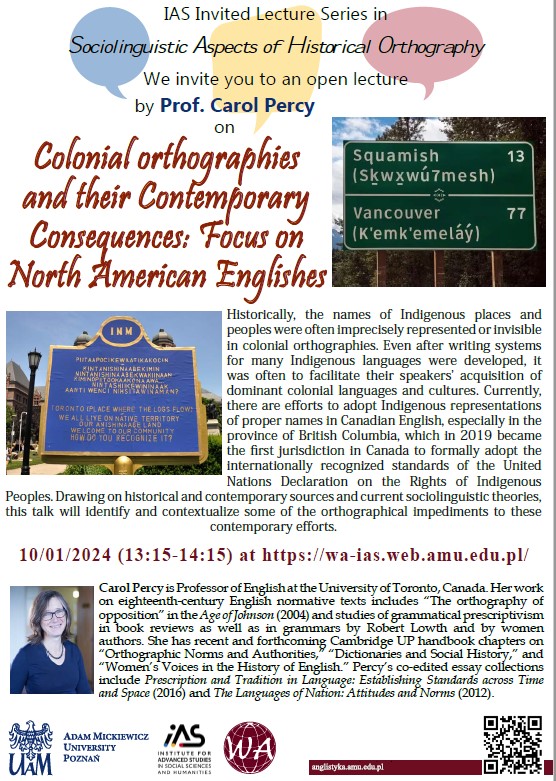The Department of the History of the English Language invites everybody to the fourth on-line lecture in the series Sociolinguistic Aspects of Historical Orthography, organised within the framework of the AMU Institute of Advances Studies in Social Sciences and Humanities programme. On Wednesday 10 January at 1.15 p.m our guest speaker, Prof. Carol Percy (University of Toronto) will talk about “Colonial orthographies and their contemporary consequences: Focus on North American Englishes”. You can join us at IAS Invited Lecture Series schedule [external link] and find more information at IAS Invited Lecture Series website [external link]. The lecture is open to everyone.
Abstract
Historically, the names of Indigenous places and peoples were often imprecisely represented or invisible in colonial orthographies. Even after writing systemsfor many Indigenous languages were developed. It was often to facilitate their speakers’ acquisition of dominant colonial languages and cultures. Currently, there are efforts to adopt Indigenous representations of proper names in Canadian English, especially in the province of British Columbia, which in 2019 became the first jurisdiction in Canada to formally adopt the internationally recognized standards of the United Nations Declaration on the Rights of Indigenous Peoples. Drawing on historical and contemporary sources and current sociolinguistic theories, this talk will identify and contextualize some of the orthographical impediments to these contemporary efforts.
Carol Percy is Professor of English at the University of Toronto, Canada. Her work on eighteenth-century English normative texts includes “The orthography of opposition” in the Age of Johnson (2004) and studies of grammatical prescriptivism in book reviews as well as grammars by Robert Lowth and by women authors. She has recent and forthcoming Cambridge UP handbook chapters on “Orthographic Norms and Authorities,” “Dictionaries and Social History,” and “Women’s Voices in the History of English.” Percy’s co-edited essay collections include Prescription and Tradition in Language: Establishing Standards across Time and Space (2016) and The Languages of Nation: Attitudes Norms (2012).

